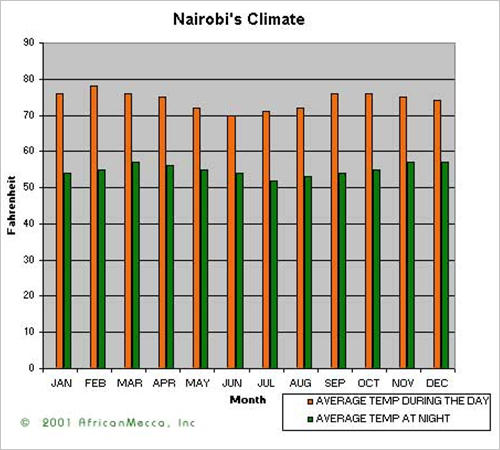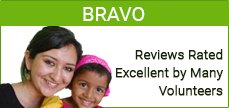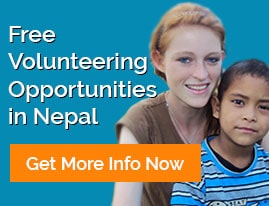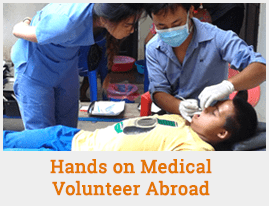VOLUNTEER IN KENYA (MASAI)
' I LOVE this experience in chitwan for though short period! '
Xue Ying Fiona WangKenya FAQs
Disclaimer:The information given in this FAQ's page is generic. You should verify critical information such as visa-related issues, health and safety, customs and transportation with the relevant authorities prior to traveling. Please be aware that information given in FAQ's may change at any time. In effect, we accept no responsibility for any loss, injury or inconvenience sustained by anyone resulting from this information. For the latest updates, please contact us or our in-country coordinator(s).
General Information
The founder of RCDP has been involved in volunteer abroad business for the last 10 years. During this time, he has worked with more than 2000 volunteers and more than 200 universities, colleges, and schools groups.
Working with inspiring college students and humanitarian volunteers was very motivating as well as very enjoyable and presented many exciting learning opportunities. This experience encouraged him to start his own volunteer abroad program where affordable prices, premium programs and meaningful contributions to deprived communities would become the key components of the programs.
With this in mind, while setting up volunteer and travel abroad organization, we have selected many safe and culturally rich destinations where volunteers can make meaningful contributions, immerse in local culture, and get enriched from volunteer abroad experience. In each destination, we have carefully selected projects, host families, travel coordinating staff, and placed local support staff. We have provided them with extensive training to manage the program with professional services that will be delivered with care and respect for all volunteers. We are now proud of our coordinators, host families, host projects, and staff as all of them have at least 4 years of working experience with international volunteers. To meet your expectation, they are committed to working hard to meet your expectations, delivering professional services, and turn your volunteer abroad experience into a memorable journey.
In Kenya, we operate in Mombasa, the coastal port city, and in Nairobi, the capital and the largest city in Kenya.
Information on Application
Starting application
There are two options available to those applying for volunteer positions in the Uganda programs:
- Apply online
- Download the application form.Then, fill it out, and mail to RCDP.
After submitting application
Once RCDP receives your application, it will immediately be forwarded to Kenya for processing. Our Kenya In-Country coordinator will then carefully review your application to ensure you get placed in the project that matches your criteria and your qualifications.
Duration of the application process
Once the Kenya In-Country coordinator finalizes and forwards us the detail, we will immediately send it to you. The whole process normally takes 1-2 weeks. However, this can sometimes take longer time.
You will also find an invoice requesting you to pay the program fee along with the placement details.
Preparation
Once you receive the placement details, you can even call our Kenya office directly and speak to our In-Country coordinator and any questions that might prepare you for the trip.
Preparation for Kenya trip includes: reading about Kenya, vaccination, visa arrangement, booking tickets. If you experience ANY problems, please call RCDP office.
Once you purchase air tickets, they should immediately forward the flight details to BOTH RCDP and Kenya office.
Information on Airport and Arrival
Arrival Airport
Volunteers should arrive at Nairobi International Airport in Nairobi, Kenya. Even if the volunteers' eventual destination is Mombasa, we want our volunteers to arrive first at Nairobi International Airport.
One of our representatives will be waiting for you in the arrival lounge holding a placard with your name on it. This will happen without fail if you have passed on your travel itinerary to our office. If you want to be absolutely sure, you can call your Kenya office and talk to our In-Country coordinator.
Flight Delayed or Missed
If your flight gets delayed or if you miss your flight and book yourself on a later flight, please let us know immediately. You must try to call first and then email the details if possible. Look at your placement details for all the contact information.
If you can not make any contact and no one receives you at the airport, look at your placement details, hire a pre-paid taxi and go to the hotel recommended on it. Let the In-Country coordinator know your whereabouts after your arrive at the hotel or the next day. The coordinator will arrange pick up for you later.
Arrival Day
Volunteers coming to Kenya are suggested to arrive one day before the start of program. If volunteers arrive more than a day earlier or remain after the close of their program, they will be responsible for providing their own accommodation and meal.
Information on Accommodation and Meal
RCDP manages your accommodation, meal and supervision at the heart of the city in Mombasa. This enables our volunteers an easy access to all parts of the city. Volunteers will initially stay in the hostel before being transferred to the project site. During the volunteering period, you will stay with a host family and you'll be provided with a separate room. The host family will serve three (3) typical meals a day. Volunteers working in an orphanage will stay inside the orphanage's compound. You can find the details of the meals and accommodations in your placement sheets.
Information on Visa
You can get a tourist visa upon arrival. However, you are recommended to get a tourist visa before arrival and avoid all the hassle of applying for one at the airport, where you might have to stay in long queue and fill out long forms.
For details on where the Kenyan embassy is in your country, visit: Kenya Embassy
Information on Health and Safety
Visit the sites listed below and acquire as much information as possible. Remember there is no harm in knowing more when it comes to health and safety.
- WHO website for international travelers (http://www.who.int/csr/ihr/en)
- Centers for Disease Control & Prevention
1600 Clifton Road , NE
Atlanta , GA 31333
(888) 232-3228
(888) 232-3299 - fax information service - Health Canada Online
- Canadian Department of Foreign Affairs and International Trade and Travel Report
- U.S. State Department & Consular Information Sheets
Room 4811
2201 C Street NW
Washington , DC 20520
(202) 647-5225 - Travel Health Online
- Travelers' Health
General Health Tips for Volunteer in Kenya
- In most of Kenya, drinking water is very safe. However, in rural areas, drink only bottled, boiled water or carbonated drinks out of cans and bottles. In the beach, tap water is not considered clean.
- Buy bottled water from proper outlets. Be wary of fake bottled water which are available everywhere. Always make sure the seal is not broken and the cap not tampered.
- Avoid eating food from road-side stalls. Eat unpeeled fruits and avoid fresh salads, especially in small hotels. If you are compelled to eat food at some place that you have doubts about, make sure the food is served hot.
- If you require any prescription drugs, bring enough for the duration of your stay in Kenya. They will need to be carried in their original prescription bottle and the prescription must be in your name.
- Please carry a small health kit which should include medicines to cure upset stomachs, some antiseptic cream, hydration powder, deer mosquito repellant, sun block, band aids, etc.
Recommended Vaccinations and Preventive Medications
The following vaccines may be recommended for your travel to Africa including Kenya. Discuss your travel plans and personal health with a health-care provider to determine which vaccines you will need.
- Hepatitis A or immune globulin (IG). Transmission of hepatitis A virus can occur through direct person-to-person contact; through exposure to contaminated water, ice, or shellfish harvested in contaminated water; or from fruits, vegetables, or other foods that are eaten uncooked and that were contaminated during harvesting or subsequent handling.
- Hepatitis B , especially if you might be exposed to blood or body fluids (for example, health-care workers), have sexual contact with the local population, or be exposed through medical treatment. Hepatitis B vaccine is now recommended for all infants and for children ages 11-12 years who did not receive the series as infants.
- Malaria: if you are traveling to a malaria-risk area in this region, see your health care provider for a prescription anti-malarial drug.
- Rabies
- Typhoid vaccine. Typhoid fever can be contracted through contaminated drinking water or food, or by eating food or drinking beverages that have been handled by a person who is infected. Large outbreaks are most often related to fecal contamination of water supplies or foods sold by street vendors
- As needed, booster doses for tetanus-diphtheria, measles , and a one-time dose of polio vaccine for adults.
- Precaution against Malaria
Required Vaccinations
A certificate of yellow fever vaccination may be required for entry into certain countries in East Africa. For detailed information, see Yellow Fever Vaccine Requirements and Information on Malaria Risk and Prophylaxis, by Country. Also, find the nearest authorized U.S. yellow fever vaccine center.
Information on Monetary Issues
Currency
Kenyan currency is "shilling" (KES).
Current exchange rates can be found using a currency converter like www.xe.com , or checking in a newspaper like the Wall Street Journal.
Exchanging
Dollars can be changed at the exchange counters inside the airport. You can also exchange at Nairobi and Mombasa.
ATM/Debit Card/Debit Card/Travelers Checks
ATM machines are available at various regions throughout Kenya, especially in Kenya City and the airport, where the option to take out US dollars or Shelling is available.
Do not arrive in Kenya without any cash as ATM machines aren't reliable and may fail to accept your card. Check with your bank to confirm that your card will work overseas. Debit cards and credit cards are acceptable at major stores. Travelers' checks are exchanged at the banks. In most locations, you won't be able to exchange them. Debit card is the best way of getting money out and ATM vendors are available in Kenya City and other places. Visa, MasterCard and American Express are accepted in large stores and hotels in larger cities.
Credit card fraud is a big problem in Kenya. Do not use cards at any smaller or non-reputable locations.
Find the Exchange Rate for Real at http://www.xe.com/ucc/
Budget
You can get by with $15 a day provided you are careful in taking your money out. Accommodation and meal during your project is provided for with the program fee but if you want to explore Kenya and shop, budget accordingly.
Information on Field Support and Supervision
We keep in touch with our volunteers. Our staffs visit volunteers every 2 weeks. You are encouraged to contact us if you want to speak with us on anything.
Information on Communicating
You'll find plenty of internet cafes around Nairobi and Mombasa and it costs about $1 to surf the net.
You can also use international phone cards to call home. You will be provided with full contact details of our office in Kenya.
Information on Weather
Kenya's weather is:
- February – March : the hottest time
- July – August : the coldest time
The coastal region is humid and wet. The lower plateau is dry.

For more detail, visit:
- BBC Weather:http://www.bbc.co.uk/weather/
- Yahoo Weather forecast (http://weather.yahoo.com)
- Weather channel (http://www.weather.com)
- Weather Underground (http://www.wunderground.com)
Information on Materials to Bring
- Camera
- Mobile phone (you can use mobile phones after changing SIM cards)
- Sleeping bag (only if you want to camp outside)
- Mosquito repellents
- Insect repellents
- Sun block lotions
- Some books of Kenya
- Map of Kenya
- Toiletries
- First-aid kits
- Flash light
- Electricity adapter/converter
- Sunglasses
- Walking shoes (for work and travel)
- Towel
Information on Bringing Gifts for Project
It will be a nice gesture if you bring items like books, pencils, color pens, toys and games, especially if you are volunteering in schools and orphanages.
You can also bring things like chocolates, CD, T-Shirts to the host family.
 1-2543048951
1-2543048951


